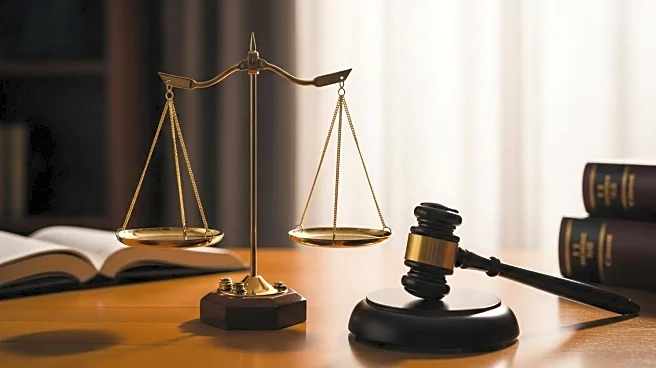What's Happening?
Former FBI Director James Comey appeared in court for his arraignment on October 8, 2025, in Alexandria, Virginia, where he pleaded not guilty to charges of false statements and obstruction of a congressional proceeding. These charges stem from his testimony before the Senate Judiciary Committee in 2020. Comey's legal team, led by attorney Patrick Fitzgerald, plans to file a motion to dismiss the case, citing vindictive and selective prosecution. The indictment was issued by a federal grand jury on September 25, following public demands by President Trump for legal action against Comey. The trial is set to begin on January 5, 2026, with the government estimating it will last 2-3 days. The case has caused turmoil within the U.S. Attorney's Office for the Eastern District of Virginia, leading to the resignation of the previous U.S. attorney, Erik Siebert, who was replaced by Halligan, a former White House aide.
Why It's Important?
The legal proceedings against James Comey are significant as they highlight ongoing tensions between the former FBI Director and President Trump, who has been a vocal critic of Comey since the investigation into Russian interference in the 2016 election. The case raises questions about the influence of political pressure on judicial processes, particularly with the appointment of Halligan, a Trump ally, to lead the prosecution. The outcome of this case could have implications for the integrity of the judicial system and the precedent it sets for handling cases involving political figures. Additionally, the involvement of classified information in the case could complicate proceedings and impact the transparency of the trial.
What's Next?
Comey's legal team plans to challenge the lawfulness of Halligan's appointment, with motions to be heard by a different judge. The government is required to respond to these motions by November 3, and the defense by November 10, with hearings scheduled for November 19 and December 9. Oral arguments on the motion to dismiss due to grand jury abuse and other undisclosed motions will be held on December 9. The judge has expressed a desire to expedite the process, particularly concerning classified information, to avoid delays in the trial.
Beyond the Headlines
The case against Comey could have broader implications for the relationship between the executive branch and the judiciary, especially in cases involving political figures. It may also influence public perception of the justice system's independence and its ability to resist political interference. The handling of classified information in the trial could set a precedent for future cases involving sensitive government data.








